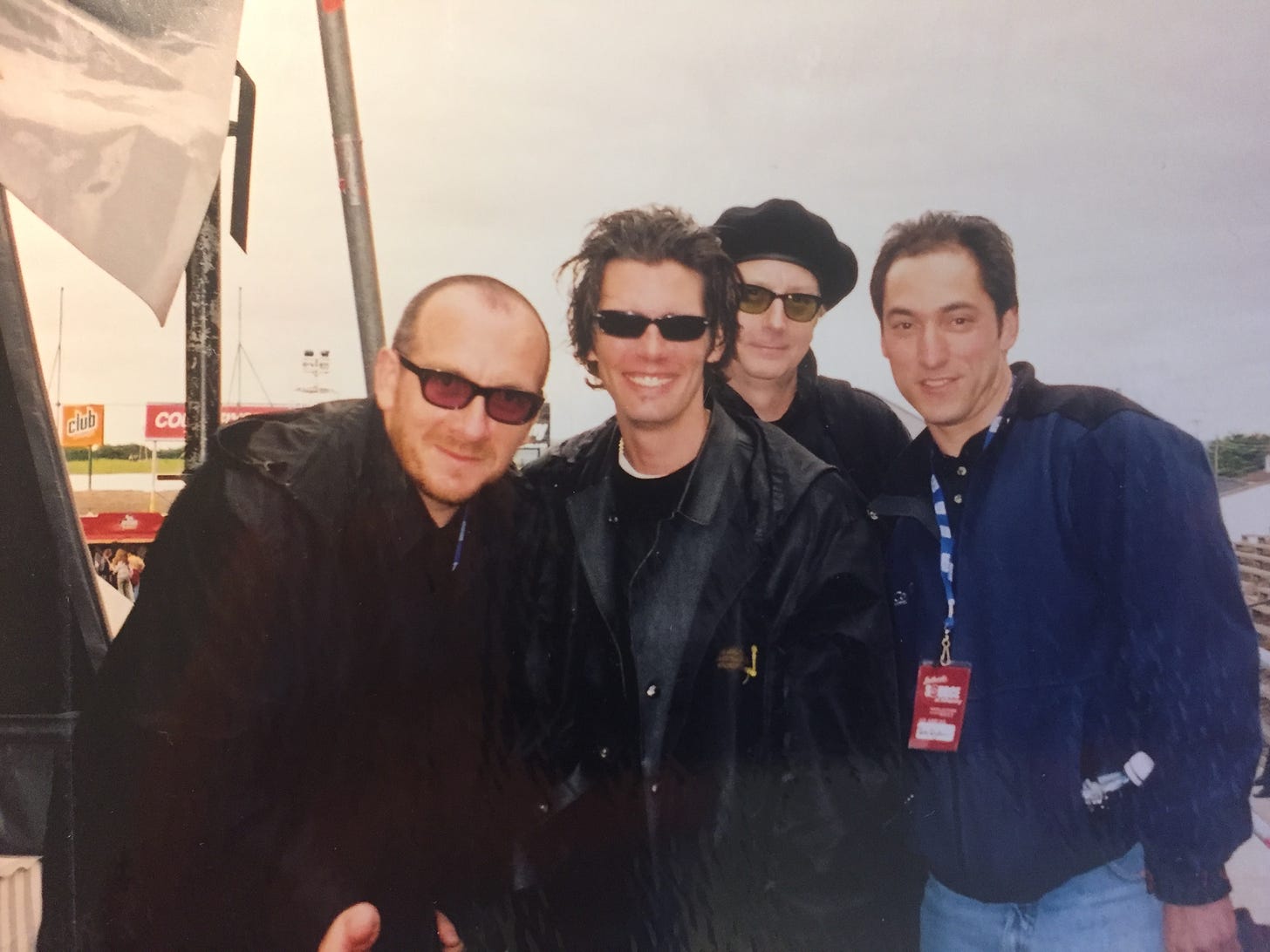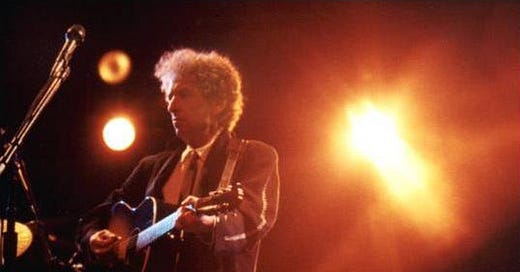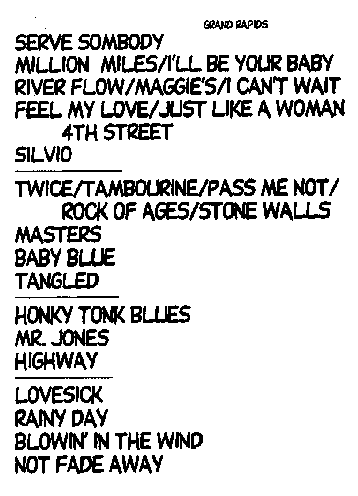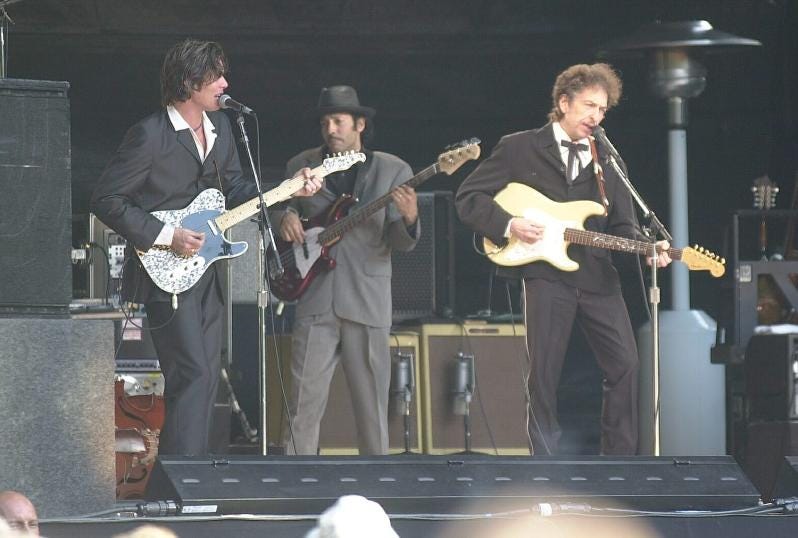Lighting Bob Dylan on the Never Ending Tour
"He doesn't want spotlights in his eyes. He doesn't want lights moving around. He just wants to do his thing."
Flagging Down the Double E’s is an email newsletter exploring Bob Dylan concerts throughout history. Some installments are free, some are for paid subscribers only. Sign up here:
In his three-decade-and-counting career, Joel Reiff has done lighting for a host of superstars from Jason Mraz to Korn. For three of those 30-plus years, from 1999-2002, he was Bob Dylan’s Lighting Director. (As it happens, his stint coincides with what some call Dylan’s greatest Never Ending Tour band.) Reiff both designed what the lights would look like in advance, then traveled the world executing his and Dylan’s vision on stage every night.
It will surprise no one who’s seen Dylan live that his lighting instructions were, basically, to keep it minimal. It’s not really a “strobe lights and lasers” sort of show. So I asked Joel how that works in practice. He told me about his job day-to-day, and also shared some memorable gigs that stick out all these years later. While there are a few funny Dylan stories near the end, this is one that gets real nerdy into the minutia of what goes into putting on a Bob Dylan concert.

How did you get the gig?
Upstaging [tour production/trucking company] suggested me. I think it was their account at the time.
Was Upstaging where you worked?
No, I just had done stuff with them before. I’ve never worked really for a lighting company. I’ve always been independent.
What instructions were you given? You’d done a bunch of lighting before, but in many ways Dylan is an oddball.
I fly in, I go to rehearsal and watch it. Bob’s leaving, and they say, “Hey, Bob, I’m going to introduce you to your new lighting guy.” They introduce us and Bob goes, “Just keep it black and white.” That was it.
Was that unusual? My impression is his lighting is fairly minimal. You think of other big artists with flashing lights and things zooming around.
You’re right about that. It’s completely minimalist. I’m all for that. I think it should be more about the music than the flash and trash. It’s best to have people look at the artist, not the lights.
Is “flash and trash” industry lingo?
Yeah, it’s kind of like when everything’s moving and lights are flashing. You’re giving your neck a nice stretch to work out. You’re not looking at the stage; you’re looking all over the place.
So what are you actually doing during a show? I saw him a couple weeks ago in concert. At that one, it literally looked like someone hit the ‘On’ switch at the beginning of the show, and then hit the ‘Off’ switch at the end.
That doesn’t surprise me. With Bob, when I started out, it was all conventional lighting, no moving lights. You would put up a look or two for a song, let him play, and then the next song, you put a different look up. Maybe you’d move between verse and chorus or something similar just so there’s a little bit of a movement. Not movement of the lights, but a slight change, a slight enhancement. Not necessarily a color, but just maybe, now they come from here instead of from here.
Is that connected to the song? If he plays “It Ain’t Me, Babe,” do you have set lighting for “It Ain’t Me, Babe”?
Sort of. I’d get the set list each day. It would be like, okay, well, this is the first song, and then one of these four songs will probably be the second song, and then one of these two might be the third song. So pretty much it was all feel. Like, if those four songs might be the second song, maybe we’ll do this one like really mellow in a lavender or something. I kept it pretty pastel-y, pretty straightforward.
And was that totally up to you? Beyond the “keep it black and white” instruction, were you coming up with the designs on your own?
Largely. I mean, it’s Bob’s show, it’s not my show. So you definitely look at what he’s done in the past and find out what he wants, what he doesn’t want. He doesn’t want flash and trash. He doesn’t want spots in his eyes all the time. He doesn’t want things moving around. He just wants to do his thing. That quote you sent from Larry was pretty good. He just wants to play.
From my Larry Campbell interview, about Dylan’s “Things Have Changed” taping for the Oscars:
We were in Australia and we had to go to a studio there. The TV director had this whole thing planned out. Bob didn’t like it. The lighting and the panning and all the stuff. He said, “Man, no, no, no. Get rid of those lights, get rid of those lights, get rid of those lights!” We ended up with just the room lights on, which gave a dark feel to him and the band on stage. You got the feeling that he was messing with the director, but it worked out great.
A few months ago I saw this thing on YouTube. The lighting just seemed a little bit more organic than what the director was trying to get to. The director was looking for a little more splash and razzle-dazzle or something and Bob just wanted this plain lighting. We played the song, it was done and that was the end of it.
Bob’s thing with these kind of performances for award shows and ceremonies and things, he was always trying to just forget about the show bit of it. Just play the song. Rather than all the smoke and lights and all the glitter - forget about all that stuff. Just shoot the band, shoot him, and play the song, so that nothing distracts from the song.
People come to him and they don’t need to see like the big flash and trash and all the lights doing everything that no one ever thought they could do. They want to see Bob play.
I’m in Burlington, Vermont and Phish is big here. There was just an article about their lighting guy and they call him like the fifth band member because the entire time he’s doing just crazy lights. Kind of the opposite of Dylan.
Yeah, Chris Kuroda, he does a great job. With Phish, they’ve got their own little thing going. I think with their music, you could probably smoke a bunch of pot and lay it back and just let all the colors and everything—you’re not probably as much watching them as you are just experiencing the whole thing. Whereas with Bob, I think you’re watching him and the band. Not to downplay Phish at all, but I think they definitely more are the total experience of immersion, whereas I think Bob’s more, “Listen to what I’m playing.”
There was another interview I did with a drummer, a decade before your time, who was talking about how dim Bob wanted the lighting during his era, and how as the drummer it was like he’s supposed to follow Bob Dylan but he can barely see him. Was that your experience? Or were you able to light him up at a reasonable level?
I could light them at a reasonable level. I wonder if that was Christopher Parker.
A sweetheart of a guy. I was with Steve Earle in the ‘90s and we opened for Dylan for a summer. I remember watching him a bunch, and I remember one time where everything was going off the rails. The next day I was having lunch with Chris, and I said, “Man, what a trainwreck yesterday. How was that?” He’s like, “We’re sitting there, we’re holding the end of the song, we’re holding, we’re holding, and then Bob suddenly just goes into something else. We’re all looking at G.E. Smith, who knows every song under the sun. And G.E.’s eyes are in the air like he can’t figure out what Bob’s doing. We’re all sitting there still holding the note, holding the note, holding the note and Bob’s just forging ahead with whatever he’s doing. Finally Bob goes, ‘Do you, Mr. Jones?’ And we all go, ‘Ahhh okay.’”
It took all the way until that line huh?
Yeah. They’re literally like just holding this [note]. It was hell. Then he finally said that line.
But, I mean, all the players were lit when I was with Bob. They all could be seen. So it wasn’t ever a case where someone was in the dark and you couldn’t see what they were doing. They were such a tight band when I was with them. And it was a real band show.
You were there a little before my time, but I’ve seen videos. Larry and Charlie especially, soloing the hell out of songs.
You’d spot them maybe for a lead, but it was not major changes. You wanted to keep one kind of look for each song for the most part. You might help people a little bit subconsciously with the verse/chorus/lead kind of thing, so there’s something happening to recognize the structure of the song, but just mellow changes.
Do you travel with all the lights, or are the lights already in the rooms?
It depends. With Bob, we had a lighting company that brought the lights with us, so we had the same rig. But sometimes you don’t. There are times when you just go to a place and you gotta use what’s there and you try to make the show to your specifications. Or to Bob’s specifications really.
The one thing we always traveled with when I was with him, were these these old theater units. They’re called R40s. And no one knows what that is, really, but think about those little old theaters and they had the lights across the front with the kind of bulbs that were really soft. They’re like six inches wide, one after the other in little metal cases.
You mean like at the front of the theater, like Johnny Cash kicking out the footlights at the Opry?
Kind of. You wouldn’t see it from the audience because they have a hood, but they would shoot up at the artists from the ground in a real soft white light. We’d use those. Even when we’d play festivals where you use what’s there, we would bring in those little footlights because Bob loved them.
When you’re getting older and you’re getting those creases in your skin, lights from above are going to make you look really bad. It’s going to give shadows. So lights from the ground like that fills it in and makes you look much better.
Was that the first time you had used them?
It was. They’re kind of big and bulky, so a lot of times people don’t want to have them on their stage. But Bob was insistent. He said he wanted to make sure that we had those. Smart, because it makes the pictures of him look better.
Would you do anything different lighting-wise for the acoustic sets versus electric?
Not really. When I did Bob, he didn’t play piano. It was all just him on guitar. I mean, if it was something where it was really broken down, I would probably just have a couple lights on. I’m into the “set it and forget it” mode sometimes. Just put a look up so people can see them and let them play. The song’s enough.
So if all’s going well, are you just sitting back? Do you have your hands on faders or buttons or anything?
A little of both. I am sitting back and just kind of watching, because Bob can always pull an audible or just decide to do whatever he wants. If he decides, “Oh, I’m going to go to ‘Ballad of a Thin Man’ in the middle of the song,” I can be ready.
Because again, on the set list, you might have four or five to choose from in that slot, then he might do a sixth one [instead]. It’d be funny. When I had my crew guys on the dimmers, we’d take bets. “I’m going for this.” “I’m guessing he’s going to play this instead.” Just to see which one of us would be right.
What sort of thing would make the guy hit the dimmers? What could go wrong?
One time in Italy all the power went out. Right before it was going out, I remember saying, “Hey, something’s going wrong here,” and then a second later, poof. Blackness. Luckily I still had my spotlights on headset, so I was just, “Iris out and keep the stage lit while we figure this out.”
Did everything cut out? Did the sound cut out? Was the show paused?
No, it was just the whole lighting rig, because the generator shit the bed. Italy. Not surprising.
So the band kept going and you just had to wing it and work with what you had.
I basically told the spots to stay, make sure Bob is always lit, and to try to get the others as best you could.
I don’t think Bob could care less either way. I’m sure they noticed, but Bob never really reacted to it. He didn’t stop and say anything. He just kept going.
Did you have much or any interaction with him on the road?
Yeah, from time to time. It’s funny. You go weeks without seeing him or talking to him except for “Hey, Bob” if he’s walking by. Then suddenly he’d call you to the dressing room twice that next week. He would just have something he just wanted to ask you about. It might not even be music-related.
Do you remember any examples?
Keep reading with a 7-day free trial
Subscribe to Flagging Down the Double E's to keep reading this post and get 7 days of free access to the full post archives.





